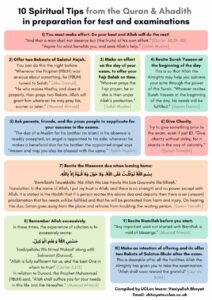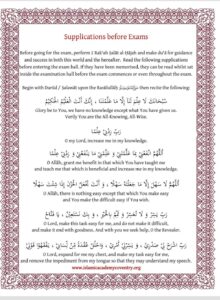Categories
PDF Books
- Post author By Ismail ibn Nazir Satia
- Post date 5 March 2023
- 1 Comment on PDF Books
- Sticky post
All Praise for Allah SWT and Peace and Blessing be on His Final Prophet. The following Aqaid must be known by all Muslims and mentioned by parents and guardians to the children.
The following are the Aqaaid taken from the Holy Qur’an and Hadith.
1. Prophet Eesa (A.S.) was born miraculously without a father. His mother Maryam (R.A.) never married. *Joseph the carpenter is not the father of Prophet Eesa (A.S ).
2. Prophet Eesa AS was not the son of God. He was a Prophet just like other Prophets (A S.)
3. He was not killed nor put on the cross. He has not yet died a physical death.
4. Allah SWT raised him physically in the heavens. 5. He will return to this world, just before Qiyamah during the reign of Imam Mahdi (R.A.). to kill Dajjaal (Antichrist). On his return, Prophet Eesa (A.S.) will be a follower of our Prophet (S.A.W.)
Note: To go against even one of the 4 mentioned Aqaid (practically, verbally etc.) or doubt any single Aqidah will be an act of Kufr.
May Allah SWT protect the Iman of all Muslims. Ameen.
Allah SWT knows best.
Mufti Muhammad Faruq Saheb (hafidhahullah)
(Date: 06/12/2020)

Question
Du’as are accepted on a Wednesday from between Dhuhr to ‘Asr. Is this correct?
Answer
This is based on the following Hadith:
Sayyiduna Jabir (radiyallahu’anhu) reports that:
‘Rasulullah (sallallahu ’alayhi wasallam) had made du’a to Allah in Masjidul Fath (in Madinah) on a Monday, a Tuesday and a Wednesday. His du’a was accepted between Dhuhr and ‘Asr on the Wednesday.’ Sayyiduna Jabir (radiyallahu’anhu)says: ‘Whenever I had a need, I waited for that moment on a Wednesday and made du’a. Every time I did so, I noticed my du’a being accepted.’
(Al-Adabul Mufrad of Imam Bukhari, Hadith: 725, Musnad Ahmad, vol.3 pg. 332 and Musnad Bazzar; Kashful Astar, Hadith: 431)
‘Allamah Mundhiri (rahimahullah) has declared the chain of Musnad Ahmad as good (jayyid) (Targhib, Hadith: 1788. Also see Majma’uz Zawaid, vol.4 pg.12)
Moulana ‘Abdul Hayy Laknawi (rahimahullah) has stated that ‘Allamah Suyuti graded the narrators of this Hadith as good (jayyid) in his book: ‘Sihamul Isabah’ and Shaykh Samhudi (rahimahullah) -in Wafaul Wafa- declared the narrators in Musnad Ahmad as reliable. (Al-Fawaidul Bahiyyah, pg.185-186)
Benefit of starting the lesson of a book of Islamic study on a Wednesday
Question
Are there any Hadiths regarding the virtue of beginning things (such as a book) on the day of Wednesday. If so can you mention the Hadith, along with its authentication and reference?
Answer
To commence a book of knowledge on a Wednesday has been the practice of the scholars for centuries.
The Author of Al-Hidayah, the Hanafi fiqh masterpiece would also do so, and he would quote a Hadith to support it.
(Al-Fawaidul Bahiyyah, pg.32 and 185. Also see Al-Maqasidul Hasanah, Hadith: 943)
Although the latter day Muhaddithun could not locate the chain for this specific narration, this practice is still substantiated by other Hadiths whose broader meaning do lend it support.
1. The Gem of the last century, Shaykh ‘Abdul Hay Al-Laknawi (rahimahullah) has written the following:
‘I have managed to deduce a basis for this from the Hadith recorded in Bukhari’s Al-Adabul Mufrad and in Musnad Ahmad and Musnad Bazzar from Jabir (radiyallahu’anhu) who said:
‘Rasulullah (sallallahu’alayhi wasallam) had made du’a to Allah in Masjidul Fath (in Madinah) on a Monday, a Tuesday and a Wednesday. His du’a was accepted between Zuhr and ‘Asr on the Wednesday. Sayyiduna Jabir says: ‘ Whenever I had a need, I waited for that moment on a Wednesday and made du’a. Every time I did so, I noticed my du’a being accepted.’
‘Allamah Suyuti graded the narrators of this Hadith as good (jayyid) in his book: ‘Sihamul Isabah’
Shaykh Samhudi (rahimahullah) -in Wafaul Wafa- declared the narrators in Musnad Ahmad as reliable.
This Hadith points to the fact that on Wednesdays, there is a moment in which du’as are accepted. Therefore they (the Scholars) liked to commence their lessons on this day.
Since those who commence any task, generally make du’a for its easy and speedy completion, their du’as will be accepted on this day and their tasks shall be completed.’
(end of quote from Shaykh Laknawi’s (rahimahullah) book: Al-Fawaidul Bahiyyah, pg.185-186)
2. Shaykh Laknawi (rahimahullah) then cites further substantiation for this practice from Shaykh Ibn ‘Arraq Al-Kinani (rahimahullah), the author of Tanzihush Shari’ah. The summary of which is:
The Sahih Hadith (in Muslim) states that Allah Ta’ala created divine light (nur) on Wednesday, and knowledge is also termed as nur, It is therefore suitable to start our acquisition of this nur on the same day. Especially since Allah Ta’ala says: ‘…and Allah will definitely complete his nur’ (Surah Tawbah, Ayah: 32)
Conclusion
Commencing Islamic study on a Wednesday indeed has support from the Hadith and the constant practice of the ‘Ulama throughout the centuries, and is therefore recommended.
However, this does not forbid commencing the lesson on another day.
And Allah Ta’ala Knows best.
Answered by: Moulana Muhammad Abasoomar
 Ponder over the following examples where very few words unlocked the greatness of three great people.
Ponder over the following examples where very few words unlocked the greatness of three great people.

Bismillahir Rahmanir Rahmeem

As exams kick off this week around the UK, we often get asked for Du’as to help and ease exam pressure. Here is one I have personally read and found beneficial:
اللّهُـمَّ لا سَهْلَ إِلاّ ما جَعَلـتَهُ سَهْلاً وَأَنْتَ تَجْعَلُ الْحَزَنَ إِذا شِئْتَ سَهْلاً
O Allah, there is no ease except in that which you have made easy and you make the difficult, if You wish, easy. [1]
P.S. One should read with conviction and certainty. Also, offer two Rak’ah Salatul Hajah before the exam. It can be the night before or the day before, not necessarily the morning of the exam.
[1] Sahih Ibn Ḥibbān (974);
‘Amal al-Yawm Wal-Laylah (351).





Ismail Ibn Nazir Satia (One who is in dire need of Allah’s forgiveness, mercy and pleasure)
12 Shaban 1437

If you wish that:
1) Any of your work must not stop
2) Or to be saved from the oppression of the oppressor
3 )Or your mountain of debt be paid
4) Or you win in a court case
5) Or any work which you think is impossible to do.
Then do the following :
Read Durood Shareef 1 x,
Then read these 4 Mubarak names of Allah 7 x:
Sharing is caring…
صدقة جارية
See link for reference:
What is the best way to deal with Anger and Waswasas?
Answer
In the name of Allāh, Most Gracious, Most Merciful
Assalāmu ῾alaykum wa Rahmatullāhi Wabarakātuh
ANGER
ANSWER TO THE FIRST QUERY: Anger is natural to man. There is no man without the instinct of anger. Allah has placed this quality in man for some reason. It is given to man for the purpose of protecting himself, his possessions, his family and his relatives. If he is bereft of the quality of anger then he will never be angry and never defend himself when attacked by an enemy or an animal. So, man is allowed to show anger to protect himself and, the Shariah has not placed any restriction on that. However, what is required s that man keeps it under control, which if he does so, he will save himself from many difficulties. Conversely, if man does not control his anger he is prone to commit innumerable sins. It is anger that gives rise to arrogance; it gives root to jealousy; an angry man bears malice and is also hostile. Hence, man needs to learn how to use this innate tool of anger for his advantage and protect himself from its abuse and nasty consequences.
A FEW ANTIDOTES
Hereunder follow a few prescriptions and antidotes to ‘diffuse’ one in the rage of anger. May Allah Ta’ala grant us the Divine ability to implement these when we are placed in such situations, Āmin.
وَإِمَّا يَنْزَغَنَّكَ مِنَ الشَّيْطَانِ نَزْغٌ فَاسْتَعِذْ بِاللَّهِ
“(O Rasulullah) If a provocation from Shaytan provokes you, then seek refuge in Allah.”
(Surah Fussilat – S.41, V.36)
That is, recite,
أَعُوْذُ باِللهِ مِنَ الشَّيْطَانِ الرَّجِيْمْ
“I seek refuge in Allah from the dejected devil.”
The devil has provoked you, but you have sought the refuge of Allah, so Allah will preserve you from its evil consequences.
“If you feel the rage of anger in you then, if you are standing, sit down. If the feeling persists in that posture, then lie down.” (Abu Dāwud, Vol.2, Pg.316, Maktabah Ramāniyyah)
“Suppose Allah was to be angry at me in the same way I am angry at this man, then what will become of me?”
We are told in a hadith that Rasulullah r came across Abu Bakr t scolding his slave. He was blaming him harshly. According to a version, Rasilullah r said,
“Remember, Allah has more power and authority over you than you have over him. You use your authority to hurt him but Allah has more authority over you.”
“Remember me in the time of your anger and I (Allah) will consider you at time when I am in full fury.”
(Ihyā Ulumiddīn Vol.2, Pg.219; Dāru Misr Littibā’ah)
“When you become angry, remain silent.”
(Ihyā Ulumiddīn Vol.2, Pg.219; Dāru Misr Littibā’ah)
By remaining silent, calm and sedate, one will be in complete control of one’s mind and senses thus allowing one to act in correct measure.
“Anger Is A Very Valuable Thing So Don’t Lose It!”
“For Every Minute You Are Angry, You Lose 60 Seconds Of Happiness!”
May Allah Ta’ālā protect us from the snares of Shaytan and nafs, and may He allow us to attain His Divine pleasure through our anger, Āmīn.
WASWASA (EVIL WHISPERS & DOUBTS)
ANSWER TO THE SECOND QUERY: From the outset we should understand that Allah Ta’ala has given Shaytan the power of whispering into the heart of a person. It is for this reason that we implore Allah’s protection against such whisperings in Surah Nās,
“I seek protection… from the mischief of the whisperer (of evil), who withdraws (after his whisper). He who whispers into the heart of mankind…”
(Surah Nās – S. 114, V. 4-6)
Whilst the evil whispers of Shaytan cannot be heard, its message can be perceived and comprehended by the heart. A golden rule to remember is that, as long as one does not subscribe to these whisperings, (into ones heart), there is no need to become worried and perturbed about them; the whisperings should merely be ignored. In the same note, whilst these whisperings pose a test to mans will-power of restraint, Allah Ta’ālā has provided man with antidotes to secure ourselves from the evil of these injected whispers taking effect.
A FEW ANTIDOTES
اَللَّهُمَّ اجْعَلْ وَسَاوِسَ قَلْبِىْ خَشْيَتَكَ وَ ذِكْرَكَ وَ اجْعَلْ هِمَّتِىْ وَ هَوَايَ فِيْمَا تُحِبُّ وَ تَرْضَى
“O Allah! Make Your fear and remembrance the obsession of my mind and divert my will and courage to the performance of deeds that please You.”
(Al Hizbul A’zam)
It is the disposition of man that his mind is always occupied and never without thoughts. His hands may be doing something but his mind is thinking of something else and continuously receives diverse thoughts. Therefore, we must implore Allah Ta’ālā via this Dua that the idle thoughts we receive be replaced by Allah’s remembrance and fear.
هُوَ الْأَوَّلُ وَالْآَخِرُ وَالظَّاهِرُ وَالْبَاطِنُ وَهُوَ بِكُلِّ شَيْءٍ عَلِيمٌ
“He is the First and the Last, the Manifest and the Hidden and He is All-Knowing about everything.”
(Surah Al Hadīd, S.57, V.3)
(Ma’āriful Qurān, English, Vol.8, Pg.305; Maktaba-e-Dārul-Uloom Karāchi.14 )
قُلِ اللَّهُمَّ فَاطِرَ السَّمَاوَاتِ وَالْأَرْضِ عَالِمَ الْغَيْبِ وَالشَّهَادَةِ أَنْتَ تَحْكُمُ بَيْنَ عِبَادِكَ فِي مَا كَانُوا فِيهِ يَخْتَلِفُونَ
“O Allah! Creator of the heavens and the earth, Knower of the unseen and the seen, You will judge between Your servants in that which they used to differ.”
(Surah Zumar – S.39, V.46)
And thereafter said, “Whenever you have a doubt about the mutual differences of the noble Sahabah t, do recite this verse.”
Additionally, Tafsir Ruhul Ma’ani reports this statement and then says,
“This incident serves to teach us the best etiquette with regard to this issue, and this is something one should always bear in mind.”
(Ma’āriful Qurān, Vol.7, Pg.570)
وَقُلْ رَبِّ أَعُوذُ بِكَ مِنْ هَمَزَاتِ الشَّيَاطِينِ . وَأَعُوذُ بِكَ رَبِّ أَنْ يَحْضُرُونِ
“Say O Muhammad r, ‘O Allah! I seek your protection from the whisperings of the Shaytān, and, O my Rabb, I seek Your protection that they (the Shaytāns) approach me (because they always approach with evil).’”
(Surah Mu’minun – S. 23, V. 98)
(Al Jāmiu Li Ahkāmil Qurān – Qurtubī, Vol.12, Pg.154; Dārul Hadīth, Egypt)
May Allah Ta’ālā allow us to recite these supplications constantly, and may He occupy our minds with His fear and remembrance, Āmīn.
And Allāh Ta῾āla Knows Best
Wassalāmu ῾alaykum
Ml. Zeyad Danka,
Student Dārul Iftā
Checked and Approved by:
Mufti Ebrahim Desai
Dārul Iftā, Madrasah In῾āmiyyah
http://www.zamzamacademy.com/2012/12/3460/
Do you want to cure your anger problem?
This is a beautiful du’a for those of us who get angry quickly:
اللّهُمَ اغْفِرْ لِيْ ذَنْبِيْ ، وَأَذْهِبْ غَيْظَ قَلْبِيْ، وَأَجِرْنِيْ مِنَ الشَّيْطَانِ
Allahummaghfirli dhanbi, wa adh-hib ghayza qalbi, wa ajirni min al-shaytan.
O Allah, forgive my sins, remove the rage in my heart and protect me from the Shaytan. (Ibn al-Sunni, 622)
If you want to see your grandchildren grow up, get married – quick! Here’s how…
Allah Ta’ala knows best.
